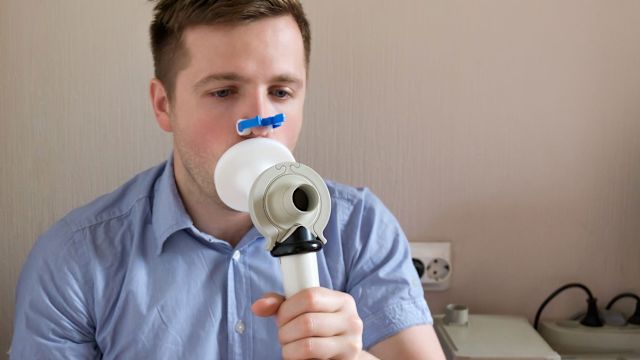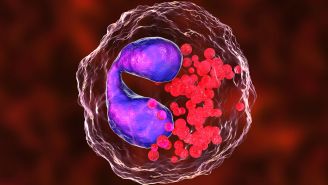Tests are an important part of asthma diagnosis and treatment. If your healthcare provider suspects you have asthma, initial testing will be performed to confirm a diagnosis, as well as determine the severity and rule out other conditions that may share similar symptoms. If you have been diagnosed with asthma, ongoing testing will help monitor your condition over time, and allow your healthcare provider to evaluate your treatment plan. Below are some of the tests you can expect.
Initial exam
To diagnose asthma, your primary care physician will review your personal and family medical history, and perform a physical exam of your chest and respiratory tract, including your nasal passages, sinuses and throat. You should discuss your symptoms, including when they occur and under what conditions. You may also have x-rays or blood work done to help rule out other possible causes of your symptoms. Your healthcare provider may be able to diagnose asthma or may refer you to an asthma specialist for further testing and confirmation.
Peak flow meter
Your healthcare provider may have you use a peak flow meter, a simple device that measures how much air you are exhaling from your lungs. Peak flow meters are small and portable, and are also an important tool for managing asthma on a day-to-day basis, as they can show you how well your lungs are performing on a given day.
Lung function testing
Pulmonary function tests can help confirm a diagnosis of asthma. During this test, you will breathe into a device known as a spirometer, which measures how much air you take in and how much you exhale. These measurements provide your healthcare provider with information about air volume and rate of flow, which in turn provides information about your overall lung functioning. If these measurements are low, your airways are constricted or blocked. Your healthcare provider may also administer a bronchodilator, an inhaled medication that opens up your air passages, and then repeat the test.
Bronchoprovocation tests
Another option your healthcare provider may use is a bronchoprovocation test—a test that provokes asthma symptoms. For this test, you will inhale cold air, or a mist that contains a small dose of a drug (either methacholine or mannitol), which in small doses will trigger asthma symptoms only in people who have asthma. If you react, your healthcare provider can confirm the diagnosis, as well as the trigger, and will give you a bronchodilator to immediately reverse the symptoms.
If exercise-induced asthma is suspected, your healthcare provider may perform an exercise challenge, taking spirometry measurements before and after you exercise on a treadmill or stationary bike. Again, if you develop symptoms, this will help confirm exercise as a trigger, and if necessary, you will be given a bronchodilator for relief.
Exhaled nitric oxide
This test measures the amount of nitric oxide in your exhaled breath. Higher levels of nitric oxide are associated with higher levels of inflammation, and this can help determine if your symptoms are being caused by asthma, as well as the severity of the asthma and what treatments might be effective.
Allergy testing
If your healthcare provider suspects that allergies provoke your asthma attacks, tests can be administered to look for specific allergens. Common triggers for allergic asthma include cigarette smoke, dust mites, cockroaches, pollen, mold, pet dander and chemicals (such as those used as ingredients in cleaning products).
Additional testing
Since symptoms of asthma can mimic those of other conditions, your healthcare provider may also call for additional tests. These tests may include chest x-rays, CT scans, blood tests, tests that look for viral or bacterial infections and tests to determine if you have gastroesophageal reflux. Sinusitis, hay fever, GERD and cystic fibrosis all share symptoms in common with asthma.
Although late-onset asthma or adult-onset asthma does occur, asthma generally develops in children and young adults. Hormonal fluctuations (such as those that occur in pregnancy) might set off asthma symptoms for the first time. Prolonged exposure to irritants in a home or workplace may also trigger asthma in adults.
If you are over the age of 40, your healthcare provider may look for indications of other conditions, such as cardiovascular disease, cancer or COPD.
Follow-up testing
Once you are diagnosed with asthma, ongoing testing helps you and your healthcare provider monitor both the condition and the effectiveness of your treatment. Follow-up testing involves spirometry measurements, peak flow monitoring and, sometimes, exhaled nitric oxide testing.






